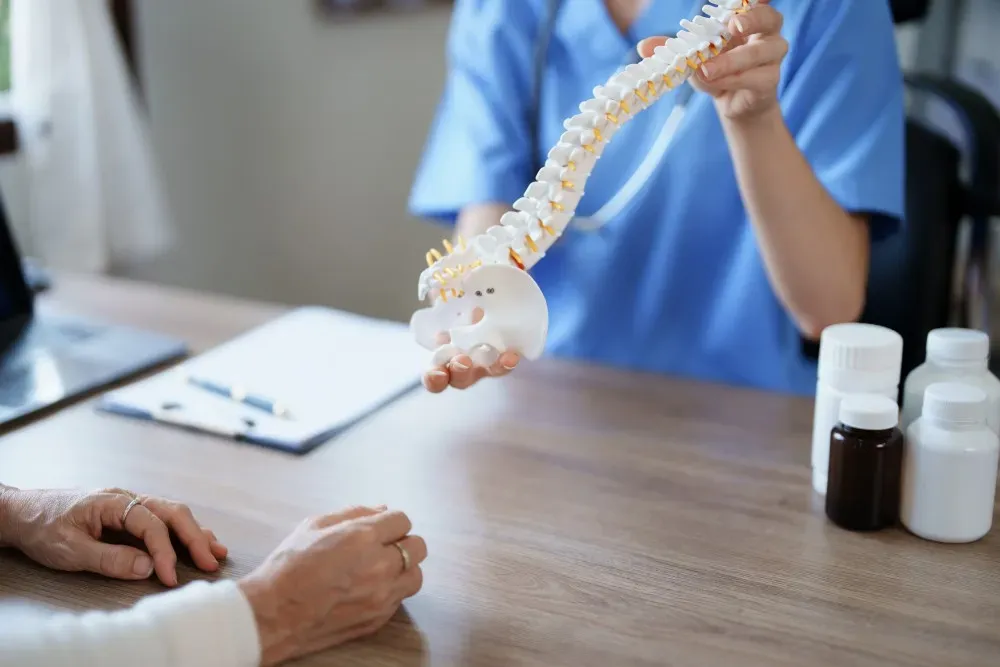Neurosurgery & Orthopedic Surgeons in Jacksonville

What Causes Joint Damage?
Joints mark the point where 2 bones meet. They’re found at your shoulders, elbows, wrists, hips, knees and ankles. Joints allow your limbs to move, which is why joint pain and damage can severely impact your life and ability to function normally.
Joints mark the point where 2 bones meet. They’re found at your shoulders, elbows, wrists, hips, knees and ankles. Joints allow your limbs to move, which is why joint pain and damage can severely impact your life and ability to function normally.
Arthritis is the most common medical condition that causes pain, swelling and inflammation of the joints. Below, read our comprehensive guide to learn signs and symptoms of joint problems, how arthritis affects your joints and treatment options to help prevent long-lasting joint damage.
SIGNS AND SYMPTOMS OF JOINT ISSUES
Joint pain is a common complaint and many acute cases resolve quickly without medical care. However, sometimes achey, painful joints are a symptom of an underlying inflammatory condition. See a doctor if you experience pain that doesn’t resolve within a few days or if you develop additional symptoms (like a fever, feeling sick or weight loss) along with joint pain.
- Pain
- Swelling
- Morning stiffness
- Tenderness
- Warmth
- Redness
- Weakness or loss of range of motion
Left uncontrolled, joint inflammation and pain can lead to permanent joint damage. If you have any of the signs or symptoms listed above, see your doctor for an examination. Early diagnosis and proactive treatment can help prevent future damage.
COMMON JOINT CONDITIONS
Arthritis is the most common medical condition that causes joint pain and leads to permanent joint damage.The term “arthritis” is an umbrella term for diseases and injuries that cause joint pain and inflammation. Arthritis affects more than 50 million adults and 300,000 children in the United States. Common forms of the condition include:
- Rheumatoid arthritis. An inflammatory form of arthritis that develops when the immune system mistakenly attacks its own tissues and causes inflammation, pain and swelling around the joints.
- Psoriatic arthritis. An inflammatory form of arthritis that affects people who have psoriasis. It develops when the body’s immune system attacks healthy tissues and causes joint inflammation and pain.
- Osteoarthritis. A non-inflammatory form of arthritis that develops when the protective cartilage covering the ends of bones wears down, causing joint pain and loss of range of motion.
- Ankylosing spondylitis. An inflammatory form of arthritis that develops in the spine and causes back pain and stiffness.
- Gout. An inflammatory form of arthritis that causes severe episodes of joint pain, inflammation and swelling.
There are other conditions that can cause joint pain and problems with joint mobility, either short-term or long-term. Some of these conditions are:
- Bursitis
- Tendonitis
- Injuries like strains or sprains
- Dislocations
- Overuse
PERMANENT JOINT DAMAGE
Over time, chronic inflammation from arthritis can cause permanent joint damage, which can lead to:
- Bone erosions
- Ligament damage
- Joint deformities
- Loss of function and range of motion
- Weakness
- Chronic pain
- Debilitation and loss of quality of life
Therefore left untreated, inflammation that causes joint pain and swelling can spread to other internal organs like the eyes, lungs, heart and kidneys. Early and aggressive treatment with medications, physical therapy and home care is necessary to help reduce your risk of debilitating damage from inflammatory joint disease.
TREATMENT OPTIONS
While acute cases of joint pain heal with self-care, you may need medical treatment if you suffer from a condition that causes chronic inflammation and pain, like inflammatory arthritis. Therefore the goal of treatment is to reduce chronic inflammatory changes, decrease pain and maintain normal joint strength and range of motion. The earlier you begin treatment, the better chance you have of controlling your symptoms and preventing permanent joint damage.
Your doctor may recommend some or all of the following treatment options, depending on the cause and severity of your pain:
1.) Medications. Over-the-counter or prescription painkillers can relieve joint pain and reduce inflammation. If you have an inflammatory form of arthritis, your doctor may prescribe disease-modifying antirheumatic drugs (DMARDs) or biologic therapy, which help reduce inflammation by suppressing or altering the immune system.
2.) Corticosteroids. Cortisone injections or oral corticosteroid treatment can help reduce inflammation around affected joints.
3.) Physical therapy. You can work with a therapist to strengthen your muscles, stabilize your joints and improve or maintain range of motion.
4.) Surgery. Joint replacement surgery may be necessary for severe cases of joint pain and loss of mobility.
5.) Home care. When you experience flare-ups at home, take time to rest and avoid activities that cause pain. Therefore you may find relief from wrapping the painful joint in a wrap or brace to stabilize it, elevating the joint above your heart to decrease pressure on the area or using a compression stocking to reduce swelling and stiffness. You can also use hot and cold compresses on painful, swollen joints.
TIPS FOR MAINTAINING HEALTHY JOINTS
Maintaining strong, healthy joints can help you avoid accidents and injuries that cause pain and damage.
Unfortunately, if your joint pain is caused by a chronic inflammatory disease like arthritis, there is no cure. But your condition can be managed and controlled with a good care regimen. By following the tips below, you can keep your joints as healthy as possible for as long as possible to prevent permanent damage and reduce pain and inflammation.
1.) EXERCISE REGULARLY. REGULAR EXERCISE HELPS KEEP YOUR JOINTS AND THE MUSCLES SURROUNDING THEM STRONG AND FLEXIBLE. MAKE SURE YOU WEAR THE RIGHT EQUIPMENT (LIKE GOOD RUNNING SHOES) AND VARY YOUR EXERCISE ROUTINES SO YOU DON’T OVERWORK ANY OF YOUR JOINTS. INCORPORATE WEIGHT TRAINING AND BODYWEIGHT EXERCISES INTO YOUR FITNESS ROUTINE TO MAINTAIN MUSCLE STRENGTH. PRACTICES LIKE YOGA AND TAI CHI CAN HELP YOU STRETCH AND STRENGTHEN MUSCLES AND JOINTS.
2.) MAINTAIN A HEALTHY WEIGHT. EXCESS WEIGHT PLACES UNDUE STRESS AND PRESSURE ON YOUR JOINTS. REGULAR EXERCISE AND A NUTRITIOUS DIET FILLED WITH FRESH, WHOLE FOODS CAN HELP YOU REMAIN AT A HEALTHY WEIGHT LEVEL.
3.) QUIT SMOKING. SCIENTISTS HAVE LINKED SMOKING TO THE DEVELOPMENT OF RHEUMATOID ARTHRITIS. ADDITIONALLY, PEOPLE WHO SMOKE MAY EXPERIENCE MORE SEVERE SYMPTOMS OF ARTHRITIS THAN PEOPLE WHO DON’T SMOKE.
4.) FOLLOW AN ANTI-INFLAMMATORY DIET. THE FOODS YOU EAT CAN IMPACT INFLAMMATION LEVELS IN YOUR BODY. FOODS HIGH IN SUGARS, SIMPLE CARBOHYDRATES, TRANS FATS AND PROCESSED INGREDIENTS MAY RELEASE MORE INFLAMMATORY MARKERS INTO THE BODY. ALCOHOL ALSO PROMOTES INFLAMMATION. INSTEAD, EAT INFLAMMATION-FIGHTING WHOLE, FRESH FOODS, FRUITS AND VEGGIES THAT ARE FULL OF NUTRIENTS AND HEART-HEALTHY FATS. ALONG WITH REDUCING INFLAMMATION IN THE BODY, A WHOLE-FOOD DIET CAN HELP YOU MANAGE YOUR WEIGHT.
5.) MANAGE STRESS. STRESS OVER-ACTIVATES THE IMMUNE SYSTEM AND CAUSES INCREASED INFLAMMATION LEVELS IN THE BODY. FIND SOLUTIONS THAT HELP YOU MANAGE YOUR STRESS: REST WHEN YOU’RE TIRED OR IN PAIN, TAKE A WARM BATH TO UNWIND, GO FOR A WALK IN THE FRESH AIR OR ENJOY QUIET TIME ALONE LISTENING TO MUSIC OR READING A BOOK. IF CHRONIC PAIN IS CAUSING YOU STRESS, ANXIETY OR DEPRESSION, SEEK PROFESSIONAL COUNSELING.
Above all, follow the prescribed treatment plan from your doctor. Taking your medications and practicing home care is the most proactive way you can manage your condition. Don’t hesitate to talk to your doctor if you start having worsening pain or new symptoms. Together, you can explore new treatment options that meet your needs.
CONTACT INTEGRITY SPINE AND ORTHOPEDICS IF YOU HAVE JOINT PAIN
Integrity Spine and Orthopedics provides treatment services for a wide range of joint and spine conditions. Our board-certified doctors specialize in general orthopedic care, chronic pain management and regenerative medicine treatments. Whether you’ve sustained an acute joint injury or you’re suffering from chronic joint pain and inflammation, we have treatment options that can help.
Call our team today at 904-456-0017 to schedule an appointment or request a free MRI review.




